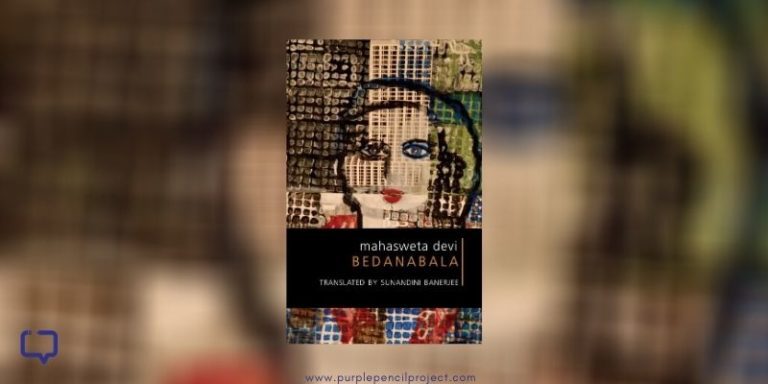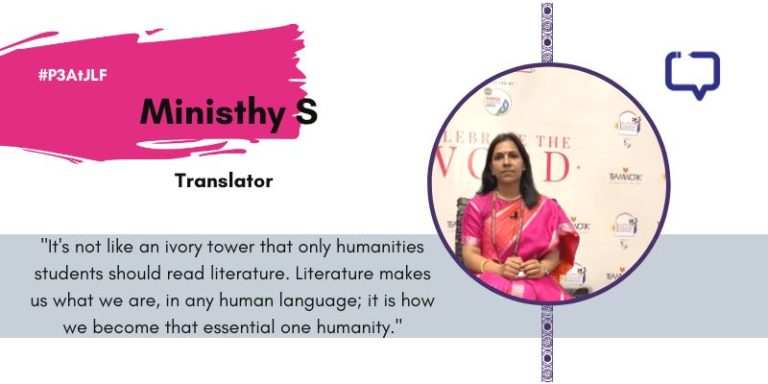Samruddhi Ghodgaonkar reviews Sakina’s Kiss by Vivek Shanbhag and translated from Kannada to English by Srinath Perur (published by Penguin, 2023).
Vivek Shanbhag’s second novel uses a simple yet compelling premise to engage its readers: two young men connected to local goons, a knock on Venkat’s door asking for his daughter and the following events that upend his life in unimaginable ways. This psychological thriller has nothing to do with Sakina or her kiss which is in itself, an amusing highlight and simply another reason to crack open the spine.
The Story
Because when I do say something, the conversation quickly jumps from one thing to another and soon we’re arguing about dangerous and uncomfortable matters such as class, equality, feminism and so on. It’s a territory full of landmines, especially in the gaps between words and actions.
– Vivek Shanbhag, Sakina’s Kiss
Masquerading as a family drama, the book introduces us to Venkat, an IT professional living in Bangalore- the middle-class aspirational Indian man who takes every opportunity to climb the socio-economic ladder. In his half-past life, he has checked every box ever presented to him. Cautious about the idea of romance, he agrees to an arranged marriage with Viji and, to his delight, finds that they share an illicit love of self-help books.
Recommended Reading: Ghachar Ghochar by Vivek Shanbhag Review
His life is on track: a double-engine house, private schools for their only child and a comfortable bank balance. Just when he thinks he has made it, problems materialise in the form of two young men from his daughter, Rekha’s college. Seeds of disquiet are sown in the minds of both husband and wife, which mushroom over the next four sleepless days as they follow the trail of crumbs left behind by Rekha. Two parallel timelines, past and present, show two journeys of the internal and external scape.
Venkat and Viji travel back to his native village to find their missing daughter. Simultaneously, Venkat reflects on recently passed volatile situations with his wife and daughter, on the ever-present cracks that have been only growing throughout his married life. The Viji and Rekha he once thought he knew, are nowhere to be found now. Instead, they whisper in his absence, shutting up immediately if he tries to sneak in on their urgent conversations.
Ideas like independent thinking and liberal values are all fine in the abstract but when your child begins to rebel at home, they turn into hot ghee in the mouth- too good to spit out, too painful to swallow.
– Vivek Shanbhag, Sakina’s Kiss
Venkat panics after realising that his control over Viji and Rekha is slipping. He constantly fights to take over their narratives and lives, which, in turn, merely sets Viji and Rekha against him during arguments. The shifting balances rattle him at every turn. He feels alone in a house full of women- the wife and daughter he refuses to understand.
His childhood memories intervene in the plot from time to time, the period spent in Malnad with his domineering uncle, Antanna, his sorrow-stricken mother, Sundari, her mysterious brother Ramanna and Venkat’s quietly assertive father. The investigation of the missing Rekha also becomes an investigation of Venkat’s worldview. Though his daughter returns, the unease born in the days when she was missing, burgeons further, never really going away.
Vivek Shanbhag’s Choice of POV
The entire novel is solely seen through the eyes of Venkat. It’s a bold yet appropriate choice and makes the novel that much more effective. Had it been narrated through a female perspective, it would have lost the authenticity that Vivek Shanbhag brings to Venkat’s character. And since it’s a cisgender heteronormative worldview, the scathing critique and dark humour prevalent in Shanbhag’s writing produces a much-desired effect.

A reader is lulled into a sense of security that Venkat could be your father, brother, uncle or you, which makes one unprepared for the incoming onslaught – the candid and ruthless dissection of a typical middle-class Indian man. Everything, from the manifestation of patriarchy to its consequences, inhabits the subtext. Shanbhag deftly manipulates words into sentences that are at once relatable and terrible, a mirror to the self.
Never once does the tone of Venkat’s narration falter. Viji and Rekha are more relatable for female readers who can easily and adeptly fill in the blanks left by Shanbhag’s text. Even though the women remain incomprehensible as characters towards the end, Shanbhag’s point is well-made. The focus is solely on Venkat and his worldview – both make the novel that much more potent.
Vivek Shanbhag’s Incisive, Economic Storytelling
Though Sakina’s Kiss has only 180 pages, Shanbhag presents the broader themes of patriarchy and a rattled Indian sense of inherited masculinity and its socio-political consequences with frightening ease in this deceptively simple plot. The novel is a masterclass in the craft of storytelling. Shanbhag, through the use of detailed descriptions of everyday occurrences, creates an eerie tension near the beginning and as the story progresses, the tonal nature of this tension shifts to what is essentially the subtext of the phrase ‘Sakina’s Kiss’.
How good things are when children depend on us for everything, how pleasant their rebellion, when it is within our control.
– Vivek Shanbhag, Sakina’s Kiss
The subtext itself is brilliantly hinted at and isn’t simply one theme but a multi-headed monster. Analysing the scenes set up over pages, a reader can tell they were constructed through the lens of a playwright. Some of them even possess a cinematic quality which, at once, pulls in the reader with their simplicity and leaves them reeling. Shanbhag plays around with time refreshingly, never taking the reader out of the story. He never underestimates his reader, smoothly manoeuvring the story around his characters.
Venkat’s core of cowardice is enveloped in layers of a closed and quivering flower bud, a highlight of the story developed meticulously. His illicit love for self-help books speaks volumes about the identity crisis that today’s ‘2BHK-2.5 kids’ sort of average Indian faces. Shanbhag cleverly anatomises the current state of masculinity that most Indian men subscribe to even after they claim to be modern and liberal. Every part of the text is lucid yet illuminating and when read attentively, the interpretations are spot-on.
Vivek Shanbhag leaves an uncomfortable feeling that grates under your skin after every couple of pages with his dark wit woven into clinical observations about a middle-class Indian family. He forces you to question the comfortable bubble constructed around you and places cracks of doubt in its structure. Do we really want the world as it is? Can we repair the torn, tattered fabric that is the great Indian family in the contemporary context?
Favourite Quotes from Sakina’s Kiss by Vivek Shanbhag
Votes are kept secret so that families stay together. A vote might contain the glow of virtue needed to sleep with one’s wife or the torment of a woman compelled to give her body to a husband she loathed. Who knew what unsaid things deep inside found expression in a vote?
It’s fine to talk about all sorts of freedoms when they are not at your throat. Now, with her own well-being in mind, it appeared best to set her on a path. That would lead to her settling down in life. I found the idea of handing over her responsibility to a husband strangely comforting.
Conclusion
Sakina’s Kiss by Vivek Shanbhag is a rich minefield of interpretations and an exceptional novel- a crying need for current times. I urge everyone from beginners to bookworms to pick it up. This novel is not one to be missed.























